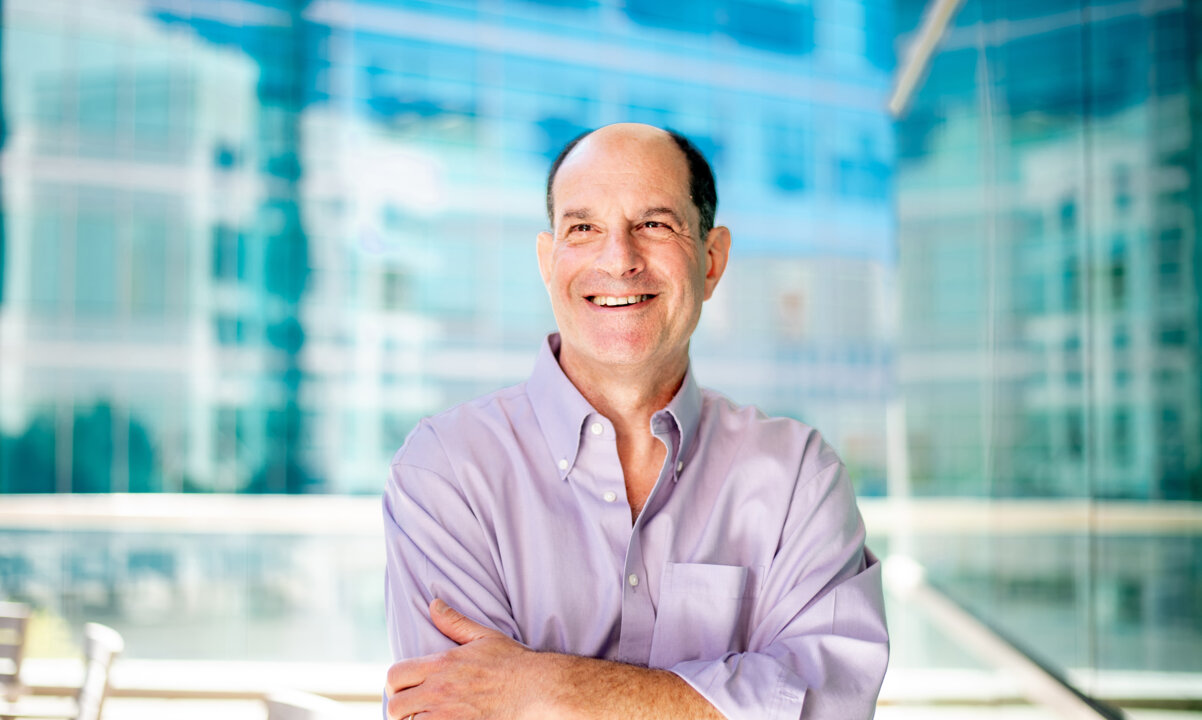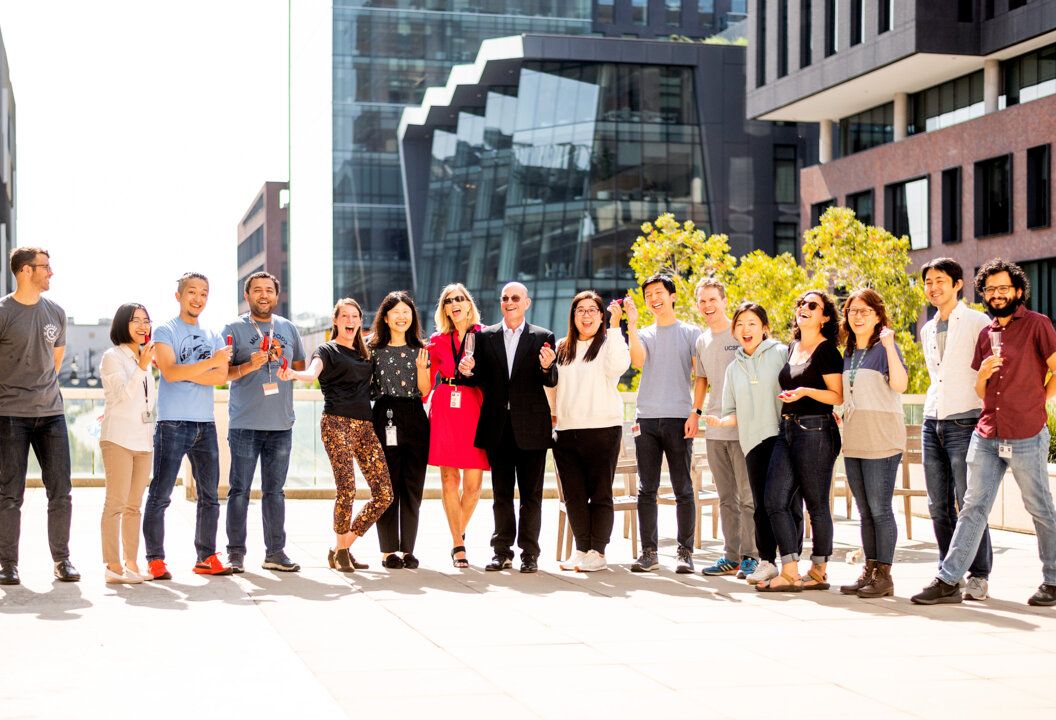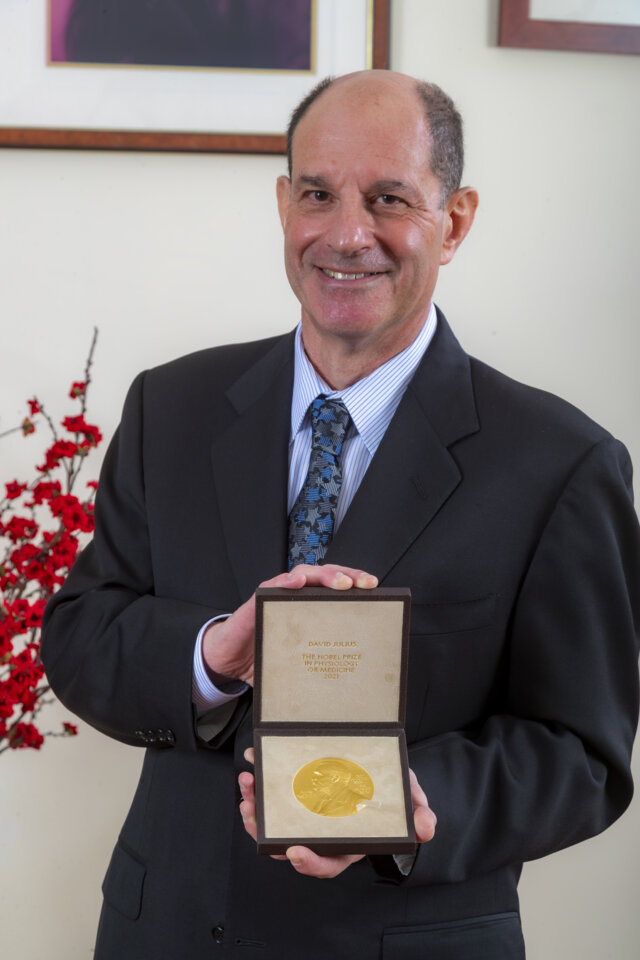“You’re responsible for your own creativity”
Interview with David Julius, February 2022
We spoke to medicine laureate David Julius about his journey into science, advice for his younger self and why he feels so privileged to be a scientist.

David Julius.
Photo by Noah Berger
Can you tell us a bit about your childhood and what sparked your interest in science?
David Julius: I grew up in a part of Brooklyn, New York, near Coney Island – an area called Brighton Beach. When I grew up there, it was a mixture of Eastern Europeans – people before and after World War II had settled there, immigrants from Poland and a lot of Eastern European countries. It was a place where people spoke a lot of different languages and was kind of an urban setting, but not like Manhattan.
It was just a normal childhood playing basketball and stick ball and riding bikes. I don’t know when I became interested in science. My dad was an engineer, so there was some connection to technology but neither of my parents were academics. They had gone to Brooklyn College, but they weren’t faculty or associated with the university. I think the thing about my parents is that they never talked to me or encouraged me to do anything based on making money. They had enough and provided for us, but they were never high earners. I don’t think that was the important thing to them. They encouraged me just to do something that I really was interested in and to do something that was kind of a noble thing to do.
I do remember my father telling me when I started working in a lab, when I was an undergraduate, he could see that I was there late at night. He said, that’s the luckiest thing in the world, there are very few people on the planet who go to work because they really want to. He said if you find something like that, then you have found what you should be doing. So, I’m very grateful to them for letting me find my way.
Do you remember any teachers or role models that made a lasting impression on you during your childhood and influenced you to become a scientist?
I had this physics teacher, Herb Isaacson, who was really great. He had been a baseball player who never went to the majors but was in the minors. He became a physics teacher and he was the most engaging teacher you could ever have. He was amazing. I’ve talked about him in some of these biographies I have written and I’ve gotten emails from people who graduated from Lincoln saying, the reason I’m a physician or I’m a scientist is I took his class as well. He was really great. In his class, it was really the first time that it was all about solving problems, not about memorising stuff. It was about how do you solve problems and how does physics describe the world?
He would really encourage us to solve these problems at home and bring them in and talk about them. I think it was at that point that I thought, maybe this is something I could do. Then a friend of mine there said you should apply to this place called MIT, which I’d never heard of. So I looked into it and I applied and I was accepted.
Then I decided I wanted to see what working in a lab is like. For me working in the lab was a real break from classes. I’m sort of fidgety. I was always hard for me to sit in classes, but being in the lab was, I think, really what kept me in college. It’s like a hobby. You’re at the bench, you get some joy out of getting experiments to work and learning how to do techniques. Then you see this data and you have to put this puzzle together. In college is really when I decided biology was what I wanted to do and that maybe I could actually do that.
Thinking about what you said earlier, about your childhood and the mixture of cultures and languages, how important is diversity in science and in a lab?
That’s one of the great things about science. I always tell people we may lose sight of this, but we are very privileged as scientists to be part of this international community. Most people go to work, they may see people from other places but sometimes not depending upon where you are. In science, it’s always an international community and people come from all over the place.
I learned to appreciate this when I was at MIT and I worked in somebody named Alex Rich’s lab. There was a visiting scientist there named Simon Litvac. He was Chilean, he and his wife, Laura, a biochemist. He was on sabbatical in MIT and I got to know him and I ended up going one summer of my junior year to his lab to work in Bordeaux. I’d never travelled anywhere. I’d been to New York and Boston, but that was about it. So I flew to Paris, and then took the train to Bordeaux where his lab was. I spent three or four months there. I still remember it today, very vividly. That was one of the most wonderful times in my life, incredibly formative.
Being a foreigner in a laboratory is a different perspective. I started thinking about all those people who came to Alex’s lab from other countries and what it was like for them and how exciting it was, but there were also some challenges. I really learned from that experience, how one of the great things about being a scientist is that you’re part of this international community. We sometimes take it for granted at our peril, especially when borders start getting closed, but in science we really rely on this. We have friends and collaborators all over the world. It’s a unique thing of research.

David Julius stands with his wife and colleagues while celebrating his Nobel Prize award on Monday, Oct. 4, 2021, in San Francisco.
Photographer: Noah Berger
Failure is an unavoidable part of science for progress. Can you tell us how you see failure and how you deal with it?
I always tell people in my lab persistence pays off! Sometimes I feel sorry for people who early on in their career, everything works magically, because then when they hit something that’s difficult it must be upending. When I was a postdoc, I spent several years just spinning my wheels and not hitting the mark. I think people have to appreciate it’s just part of it. Sniffing up some wrong alleys and going along some paths, you might get scooped on occasion or this or that. It’s hard to be lost in the woods and not know exactly where you’re going. It can be a little unsettling, but I think you have to keep faith as long as you’re interested in what you’re doing.
I think you have to pick problems where you can retain enough excitement to always keep rekindling your interest in something. Because there’s going to be times when you’re just struggling to get back on track. I think if you pick a problem that generally captures your imagination and your excitement, then you can always figure out another path or keep going and get re-energised. That’s why I think it’s really helpful to be in a place where there’s a lot of energy. Even if it’s not at your own bench, take excitement from other people’s successes and look at it and say, science can be really exciting, I’m going to get there too.
When we’re training as students or fellows, we tend to be very focused on what’s happening in terms of our experiments and where things are going day to day or week to week. But I think many of us have a plan in our head, of what we’re interested in and what our long term goal is. I think you have to sit back every once in a while and remember that because that’s really where the persistence comes from.
With the life experience you have now, is there something you would have liked to have said to your younger self when you started out?
I think one is if you’ve had any success in the past, you should take stock of that and realise that that will happen again, if you’re persistent, if you’re determined and you’re interested in science. I think it’s important to also relax a little bit. You have to be driven and you have to be determined and work hard, but I think emotionally you have to be relaxed and enjoy the process. I once heard Paul Nurse say when he was being interviewed on television – and I completely resonated with this – he said, sometimes things aren’t working, but you have to take joy in the experiments themselves. You should enjoy the process.
Of course, you have to keep your mind on what your scientific goal is, but you should also enjoy the process and take some pride in doing experiments well and mastering new techniques because that’s the joy of the moment that gets you from place to place.
I see what you mean about the importance of relaxing. What do you like to do in your spare time?
I really like music. I like all kinds of music, but I particularly like jazz. When I really want to relax, I turn on a little Miles Davis or Frank Sinatra in my office or at home. I used to play the cello when I was younger. One of my misgivings is that as I travelled around and went to college and grad school, I stopped playing an instrument. Then later in life, I decided I would try and play an instrument again. It’s really hard to play an instrument if you can’t devote time to it, but I’ve decided to try and play the trumpet, because I always figured I’d like to try a wind instrument. So I do that. My family’s very tolerant, my son wears his noise cancelling headphones!
Then I’m on the board of the Diablo regional arts association – it is the nonprofit programming arm of a theater. We raise funds for programs for local school kids and we have a jazz series in the summer and various things. So that takes me out of my science and lets me do something that’s different.

David Julius with his Nobel Prize. Beckman Center, National Academy of Sciences, Irvine, USA.
© Nobel Prize Outreach. Photo: Paul Kennedy
Do you see any connections between music and science?
I tell people that being a scientist is – maybe this is a bit fanciful – but it’s really not so different than being an artist. You’re responsible for your own creativity.
You have the freedom to fail to succeed. If I decided tomorrow that I want to work on the biology of toenail development, I can do it as long as I can convince people to work with me on that. It’s your responsibility and your creativity.
I think scientists have the easier life than performing artists, because there are many more positions in the world, right now anyway, for scientists than there are for a prima ballerina. But still I think every day when you get up, you have questions about, am I being creative and am I being productive and am I producing something that people are interested in and find helpful? Am I training people? Am I being a good mentor? You know, all the things that I think many artists, at least performing artists, are wrestling with themselves.
I think there’s a lot of similarities there. You have to find your own unique voice. You don’t just want to do what everybody else is doing. You want to do something unique and be known for a certain creative style, and I’m sure that’s what, people like Miles Davis or Chet Baker or John Coltrane were trying to do too.
Nobel Prizes and laureates
Six prizes were awarded for achievements that have conferred the greatest benefit to humankind. The 14 laureates' work and discoveries range from quantum tunnelling to promoting democratic rights.
See them all presented here.
